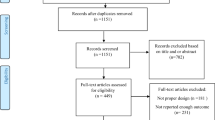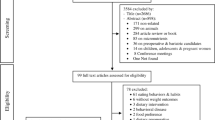Abstract
In bariatric practice, a preoperative weight loss of at least 5% is recommended. However, the hypocaloric diets prescribed vary and no consensus exists. This study examined the efficacy of preoperative diets in achieving 5% weight loss. From a systematic literature search, eight randomised controlled trials (n = 862) were identified. Half of the trials used a “very-low-calorie diet” whilst the rest employed a “low-calorie diet”. Only five diets achieved ≥ 5% weight loss over varying durations and energy intakes. By inference, compliance with a 700–1050 kcal (2929–4393 kJ) diet, consisting of moderate carbohydrate, high protein and low/moderate fat, for 3 weeks is likely to achieve 5% weight loss. A low-carbohydrate diet (< 20 g/day) may achieve this target within a shorter duration. Additional research is required to validate these conclusions.

Similar content being viewed by others
References
Butland B, Jebb S, Kopelman P, McPherson K, Thomas S, Mardell J, et al. Foresight tackling obesities: future choices – project report. Government Office for Science. 2007.
Kim JJ, Rogers AM, Ballem N, et al. ASMBS updated position statement on insurance mandated preoperative weight loss requirements. Surg Obes Relat Dis. 2016;12(5):955–9.
Ng M, Fleming T, Robinson M, et al. Global, regional and national prevalence of overweight and obesity in children and adults 1980-2013: a systematic analysis. Lancet. 2014;384(9945):766–81.
Pasco JA, Nicholson GC, Brennan SL, et al. Prevalence of obesity and the relationship between the body mass index and body fat: cross-sectional, population-based data. PLoS One. 2012;7(1):e29580.
World Health Organisation. Obesity and overweight [Internet]. 2017. Available from: http://www.who.int/mediacentre/factsheets/fs311/en/
American Diabetes Association. Standards of medical care in diabetes 2016 abridged for primary care providers. Clin Diabetes. 2016;34(1):3–21.
National Health and Medical Research Council. Clinical practice guidelines for the management of overweight and obesity in adults, adolescents and children in Australia [Internet]. Commonwealth of Australia 2013. Canberra. 2013. Available from: https://www.nhmrc.gov.au/guidelines-publications/n57
National Institute for Health and Care Execellence. Obesity: identification, assessment and management - clinical guideline [CG189] [Internet]. 2014. Available from: https://www.nice.org.uk/guidance/cg189
Miras AD, le Roux CW. Mechanisms underlying weight loss after bariatric surgery. Nat Rev Gastroenterol Hepatol. 2013;10(10):575–84.
Schmidt JB, Pedersen SD, Gregersen NT, et al. Effects of RYGB on energy expenditure, appetite and glycaemic control: a randomized controlled clinical trial. Int J Obes. 2013;40(2):1–10.
Picot J, Jones J, Colquitt JL, et al. The clinical effectiveness and cost-effectiveness of bariatric (weight loss) surgery for obesity: a systematic review and economic evaluation. Health Technol Assess. 2009;13(41):1–190. 215–357, iii–iv
Runkel N, Colombo-Benkmann M, Hüttl TP, et al. Evidence-based German guidelines for surgery for obesity. Int J Color Dis. 2011;26(4):397–404.
Mechanick JI, Youdim A, Jones DB, et al. Clinical practice guidelines for the perioperative nutritional, metabolic, and nonsurgical support of the bariatric surgery patient--2013 update. Surg Obes Relat Dis. 2013;9(2):159–91.
Remedios C, Bhasker AG, Dhulla N, et al. Bariatric nutrition guidelines for the Indian population. Obes Surg. 2016;26(5):1057–68.
Thorell A, MacCormick AD, Awad S, et al. Guidelines for perioperative care in bariatric surgery: enhanced recovery after surgery (ERAS) society recommendations. World J Surg. 2016;40(9):2065–83.
Colles SL, Dixon JB, Marks P, et al. Preoperative weight loss with a very-low-energy diet: quantitation of changes in liver and abdominal fat by serial imaging. Am J Clin Nutr. 2006;84(2):304–11.
Fris RJ. Preoperative low energy diet diminishes liver size. Obes Surg. 2004;14(9):1165–70.
van Wissen J, Bakker N, Doodeman HJ, et al. Preoperative methods to reduce liver volume in bariatric surgery: a systematic review. Obes Surg. 2016;26(2):251–6.
Schwartz ML, Drew RL, Chazin-Caldie M. Factors determining conversion from laparoscopic to open Roux-en-Y gastric bypass. Obes Surg. 2004;14(9):1193–7.
Schwartz ML, Drew RL, Chazin-Caldie M. Laparoscopic Roux-en-Y gastric bypass: preoperative determinants of prolonged operative times, conversion to open gastric bypasses, and postoperative complications. Obes Surg. 2003;13(5):734–8.
Brody F, Vaziri K, Garey C, et al. Preoperative liver reduction utilizing a novel nutritional supplement. J Laparoendosc Adv Surg Tech. 2011;21(6):491–5.
Lewis MC, Phillips ML, Slavotinek JP, et al. Change in liver size and fat content after treatment with Optifast® very low calorie diet. Obes Surg. 2006;16(6):697–701.
Edholm D, Kullberg J, Haenni A, et al. Preoperative 4-week low-calorie diet reduces liver volume and intrahepatic fat, and facilitates laparoscopic gastric bypass in morbidly obese. Obes Surg. 2011;21(3):345–50.
Ross LJ, Wallin S, Osland EJ, et al. Commercial very low energy meal replacements for preoperative weight loss in obese patients: a systematic review. Obes Surg. 2016;26(6):1343–51.
Garvey WT, Mechanick JI, Brett EM, et al. American Association of Clinical Endocrinologists and American College of Endocrinology clinical practice guidelines for comprehensive medical care of patients with obesity – executive summary. Endocr Pract. 2016;22(7):842–84.
Lu Y, Hajifathalian K, Ezzati M, et al. Metabolic mediators of the effects of body-mass index, overweight, and obesity on coronary heart disease and stroke: a pooled analysis of 97 prospective cohorts with 1·8 million participants. Lancet. 2014;383(9921):970–83.
Hanazaki K, Maeda H, Okabayashi T. Relationship between perioperative glycemic control and postoperative infections. World J Gastroenterol. 2009;15(33):4122–5.
Nomikos IN, Sidiropoulos A, Vamvakopoulou DN, et al. Surgical complications of hyperglycaemia. Curr Diabetes Rev. 2009;5(2):145–50.
Cassie S, Menezes C, Birch DW, et al. Effect of preoperative weight loss in bariatric surgical patients: a systematic review. Surg Obes Relat Dis. 2011;7(6):760–7.
Livhits M, Mercado C, Yermilov I, et al. Does weight loss immediately before bariatric surgery improve outcomes: a systematic review. Surg Obes Relat Dis. 2009;5(6):713–21.
Kalarchian MA, Marcus MD, Courcoulas AP, et al. Preoperative lifestyle intervention in bariatric surgery: initial results from a randomized, controlled trial. Obesity. 2013;21(2):254–60.
Kadeli DK, Sczepaniak JP, Kumar K, Youssef C, Mahdavi A, Owens M. The effect of preoperative weight loss before gastric bypass: a systematic review. J Obes. 2012;2012(Article ID 867540).
Gerber P, Anderin C, Thorell A. Weight loss prior to bariatric surgery: an updated review of the literature. Scand J Surg. 2015;104(1):33–9.
Adrianzén Vargas M, Cassinello Fernández N, Ortega Serrano J. Preoperative weight loss in patients with indication of bariatric surgery: which is the best method? Nutr Hosp. 2011;26:1227–30.
Baldry EL, Leeder PC, Idris IR. Pre-operative dietary restriction for patients undergoing bariatric surgery in the UK: observational study of current practice and dietary effects. Obes Surg. 2014;24(3):416–21.
Moher D, Shamseer L, Clarke M, Ghersi D, Liberati A, Petticrew M, et al. Preferred reporting items for systematic review and meta-analysis protocols (PRISMA-P) 2015 statement. Syst Rev. 2015;4(1).
Liberati A, Altman DG, Tetzlaff J, Mulrow C, Gøtzsche PC, Ioannidis JPA, et al. The PRISMA statement for reporting systematic reviews and meta-analyses of studies that evaluate health care interventions: Explanation and elaboration. Vol. 6, PLoS Med. 2009.
Miller S, Forrest J. Enhancing your practice through evidence-based decision making: PICO, learning how to ask good questions. J Evid Based Dent Pract. 2001;1(2):136–41.
Clarivate Analytics. EndNote [Internet]. 2017. Available from: http://endnote.com/
Centre for Reviews and Dissemination. Systematic reviews: CRD’s guidance for undertaking systematic reviews in health care [Internet]. University of York. 2009. Available from: https://www.york.ac.uk/media/crd/Systematic_Reviews.pdf
Downs S, Black N. The feasibility of creating a checklist for the assessment of the methodological quality both of randomized and non-randomized studies of health care interventions. J Epidemiol Community Health. 1998;52:377–84.
Katrak P, Bialocerkowski AE, Massy-Westropp N, et al. A systematic review of the content of critical appraisal tools. BMC Med Res Methodol. 2004;4(1):22.
Schutz T, Peter V, Garnov N, et al. Effect of two preoperative low energy diets on liver volume in bariatric patients: a randomized trial. Obes Facts. 2014;7:83.
Chakravartty S, Sidhu P, Vivian G, et al. Randomised controlled trial on pre-operative liver shrinking diet on peri-operative outcomes in patients undergoing gastric bypass: is it time to change our practice? Obes Surg. 2014;24(8):1141.
Baldry E, Aithal G, Kaye P, et al. Effects of short-term energy restriction on liver lipid content and inflammatory status in severely obese adults: results of a randomised controlled trial (RCT) using two dietary approaches. Diabetes Obes Metab. 2017;19(8):1179–83.
Nielsen LV, Nielsen MS, Schmidt JB, et al. Efficacy of a liquid low-energy formula diet in achieving preoperative target weight loss before bariatric surgery. J Nutr Sci. 2016;5:e22.
Schouten R, van der Kaaden I, van’t Hof G, et al. Comparison of preoperative diets before bariatric surgery: a randomized, single-blinded, non-inferiority trial. Obes Surg. 2016;26(8):1743–9.
Kalarchian MA, Marcus MD, Courcoulas AP, et al. Preoperative lifestyle intervention in bariatric surgery: initial results from a randomized, controlled trial. Obesity (Silver Spring). 2013;21(2):254–60.
Heinberg LJ, Schauer PR. Pilot testing of a portion-controlled, commercially available diet on presurgical weight loss and metabolic outcomes in patients undergoing bariatric surgery. Obes Surg. 2014;24(10):1817–20.
Faria SL, Faria OP, Cardeal MDA, et al. Effects of a very low calorie diet in the preoperative stage of bariatric surgery: a randomized trial. Surg Obes Relat Dis. 2015;11(1):230–7.
Ochner CN, Dambkowski CL, Yeomans BL, et al. Pre-bariatric surgery weight loss requirements and the effect of preoperative weight loss on postoperative outcome. Int J Obes. 2012;36(11):1380–7.
Mulholland Y, Nicokavoura E, Broom J, et al. Very-low-energy diets and morbidity: a systematic review of longer-term evidence. Br J Nutr. 2012;108(5):832–51.
Tsai AG, Wadden TA. The evolution of very-low-calorie diets: an update and meta-analysis. Obesity. 2006;14(8):1283–93.
Disease NI of D and D and K. Very low calorie diets [Internet]. 2012. Available from: https://www.niddk.nih.gov/health-information/weight-management/very-low-calorie-diets
Mendez MA, Wynter S, Wilks R, et al. Under- and overreporting of energy is related to obesity, lifestyle factors and food group intakes in Jamaican adults. Public Health Nutr. 2004;7(1):9–19.
Ferrari P, Slimani N, Ciampi A, et al. Evaluation of under- and overreporting of energy intake in the 24-hour diet recalls in the European prospective investigation into cancer and nutrition (EPIC). Public Health Nutr. 2002;5(6b):1329–45.
Joo NS, Lee DJ, Kim KM, et al. Ketonuria after fasting may be related to the metabolic superiority. J Korean Med Sci. 2010;25(12):1771–6.
Brinkworth GD, Buckley JD, Noakes M, et al. Long-term effects of a very low-carbohydrate diet and a low-fat diet on mood and cognitive function. Arch Intern Med. 2009;169(20):1873–80.
Martin CK, Rosenbaum D, Han H, et al. Change in food cravings, food preferences, and appetite during a low-carbohydrate and low-fat diet. Obesity. 2011;19(10):1963–70.
Westerterp-Plantenga MS, Lemmens SG, Westerterp KR. Dietary protein - its role in satiety, energetics, weight loss and health. Br J Nutr. 2012;108(SUPPL. 2):S105–12.
British Dietetic Association. BDA Dietary Fat Consumption in the Management of Type 2 Diabetes Policy Statement [Internet]. 2015. Available from: https://www.bda.uk.com/news/view?id=95
Colica C, Merra G, Gasbarrini A, et al. Efficacy and safety of very-low-calorie ketogenic diet: a double blind randomized crossover study. Eur Rev Med Pharmacol Sci. 2017;21(9):2274–89.
Pogozelski W, Arpaia N, Priore S. The metabolic effects of low-carbohydrate diets and incorporation into a biochemistry course. Biochem Mol Biol Educ. 2005;33(2):91–100.
Thibault R, Pichard C. Overview on nutritional issues in bariatric surgery. Curr Opin Clin Nutr Metab Care. 2016;19(6):484–90.
Nutrition SAC on. Carbohydrates and health. London; 2015.
Egger M, Smith GD. Meta-analysis bias in location and selection of studies. BMJ. 1998;316(7124):61–6.
Haldar S, Chia SC, Henry CJ. Body composition in Asians and Caucasians: comparative analyses and influences on cardiometabolic outcomes. Adv Food Nutr Res. 2015;75:97–154.
Delbridge E, Proietto J. State of the science: VLED (very low energy diet) for obesity. Asia Pac J Clin Nutr. 2006;15(SUPPL. 1):49–54.
Dickersin K. The existence of publication bias and risk factors for its occurrence. JAMA. 1990;263(10):1385–9.
Author information
Authors and Affiliations
Corresponding author
Ethics declarations
Conflict of Interest
The authors declare that they have no conflict of interest.
Statement Regarding Ethics
This article does not contain any studies with human participants or animals performed by any authors.
Consent Statement
This article does not contain any studies with human participants or animals performed by any authors.
Rights and permissions
About this article
Cite this article
Naseer, F., Shabbir, A., Livingstone, B. et al. The Efficacy of Energy-Restricted Diets in Achieving Preoperative Weight Loss for Bariatric Patients: a Systematic Review. OBES SURG 28, 3678–3690 (2018). https://doi.org/10.1007/s11695-018-3451-1
Published:
Issue Date:
DOI: https://doi.org/10.1007/s11695-018-3451-1




